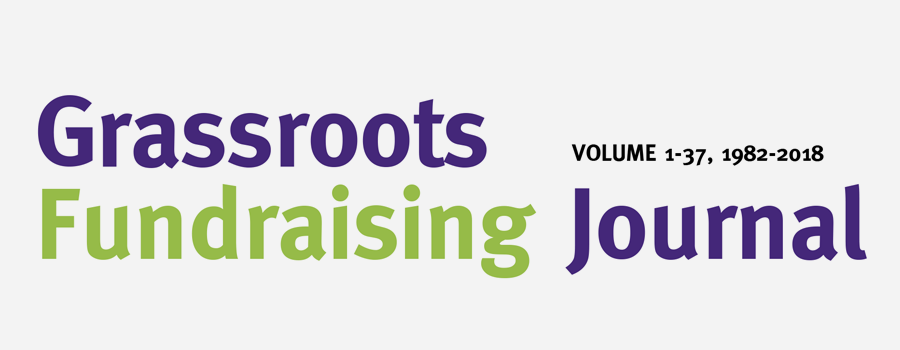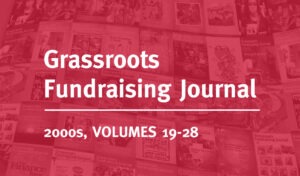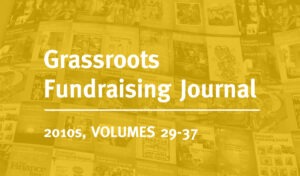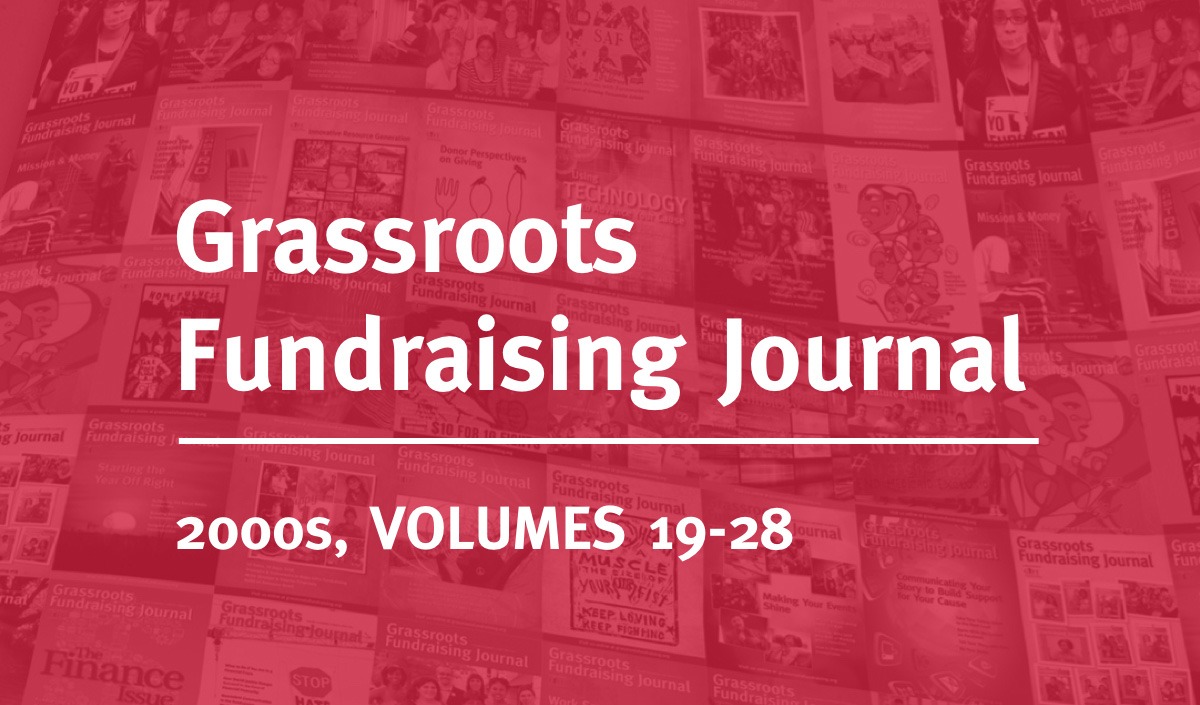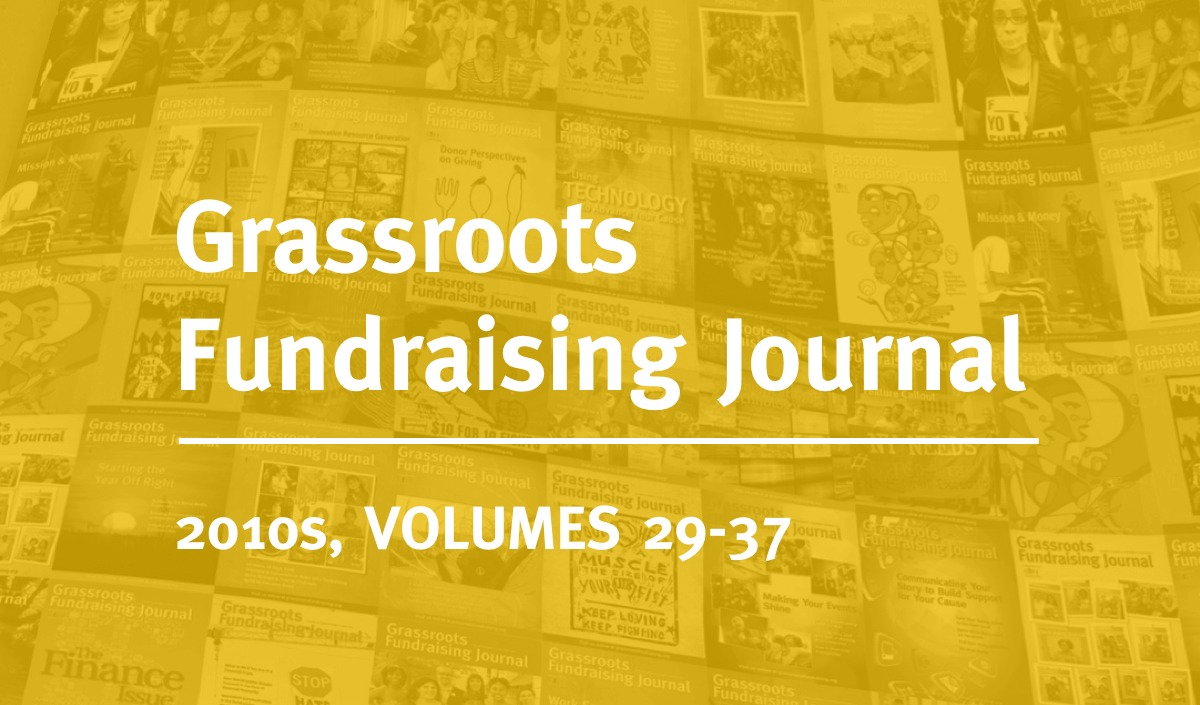
Editors’ note: This article, first published in print during Sep/Oct 2010, has been republished for Nonprofit Quarterly with minor updates.
When would you like me to wash your car?
Have you considered adopting an adult?
May I have another piece of cheesecake?
But seriously, folks…
Sign up for our free newsletters
Subscribe to NPQ's newsletters to have our top stories delivered directly to your inbox.
By signing up, you agree to our privacy policy and terms of use, and to receive messages from NPQ and our partners.
If you’re new to face-to-face fundraising, you’re probably focusing on “the ask”: how to frame your request in the most compelling, inspiring way. Without a doubt, a strong ask is one of the keys to successful fundraising—but then what? When you hear the words, “Yes, I’d like to help,” how do you respond?
First of all, be grateful and enthusiastic. Show your heartfelt appreciation. Talk about how the gift will make a difference.
Then it’s time for the “after questions.”
Not every question below is relevant for every donor or every visit. You’re engaged in a conversation or perhaps a negotiation, not an interrogation. Choose the questions that seem most relevant and adapt them to your needs and circumstances.
- “How would you like to pay? Do you want to write a check now? Would you like us to send you a pledge statement in the mail? Are you interested in signing up for our sustainer program—that way you can fulfill your pledge in automatic monthly installments.” Many solicitors bring pledge forms to the meeting and fill them out with the donor. The main question above, along with several below, could easily be included on this form.
- “How do you want us to use this gift?” Check your notes from this meeting and all previous conversations with the donor. If you sense any indications that she wants to restrict her gift to a specific program or campaign, this is the time to clarify and honor that intent.
One of the advantages of engaging individual donors (compared to foundations, corporations, or government grantmakers) is that, in most cases, they can provide general donations to use as you see fit. You want unrestricted gifts whenever possible and need to be comfortable asking for them. If the donor has indicated an interest in earmarking her contribution, however, a skilled asker can sometimes negotiate a broader use of the money. This gives the organization more flexibility while still meeting the donor’s goals.
For example, you might say to the donor, “You’ve expressed an interest in child development, which encompasses nearly everything we do. With the understanding that you want your gift to benefit children and their families, may we use the money to support our children’s programs as we see fit?”
If you’re seeking restricted funds, before meeting with donors be sure your organization has a gift acceptance policy. It should specify, among other things, the minimum donation that would qualify as a restricted gift. If you set a number that’s too low, expect a battle with your bookkeeper—and we support the bookkeeper. (For more on gift acceptance policies, see “Gift Acceptance Policies and Legacy Giving,” by Fred Matthews, Grassroots Fundraising Journal, Vol. 26, No. 2.) - “How would you like to be recognized? We publish donor names in our newsletter, our annual report, and our website. We’d love to include your name so we can publicly express our thanks—and your commitment will inspire other people to give. May we list your name or would you prefer to be anonymous?”
- “Do you want your gift to honor someone you care about? We can list their name, your name, or both.” When preparing your pledge form, include space to collect this information.
- “Tell me a little more about why you support our work. We’re always interested in what motivates our donors to give; this helps us reach out to other potential donors. You just made a very generous decision—I’d really appreciate knowing why.”
- “Would you be willing to give a testimonial we can use in our newsletter and other promotional materials? May we include your photo? Our most generous supporters—people like you—are our most credible advocates. May we have a sentence or two to share with others?” Note: depending on the nature of your organization (and the advice of your attorney), you may require a signed photo release form.
- “Would you be willing to join us at a board meeting and talk about why you support our work? It’s really helpful for the board to hear directly from donors—it reminds them why we do the work we do and why it’s important to ask people to contribute. It will inspire them to work harder in support of our mission. Would you share your experience with the board?”
- “How would you like to be kept informed about our work—and how often? Do you want a printed newsletter or do you prefer brief emails? Shall I phone you from time to time? Do you participate in social media like Facebook? Would you prefer to receive updates in person—and if so, how many times per year?”
- “When I come back to give you an update, would you be willing to include family members so they can learn about your support of our work?” If you’re cultivating donors for future gifts, especially planned gifts, this is an essential step.
- “Can you recommend other people we can talk to about a gift? Do you have friends or colleagues who might want to join you in supporting our work? Would you be willing to make an introduction—by phone, by email, or in person—or join me for the initial visit?”
- “Given your strong commitment to our work, would you consider volunteering to help us raise money? For example, would you be willing to come along and talk about why you give when I meet with prospects?”
- The final question requires some courage, but asking it is a lot better than wading through a series of unspoken assumptions: “What’s your personal giving calendar? Are you typically a once-a-year donor? Twice a year? If we have an urgent need, can we approach you again? What schedule works best for you?”
Capture all this information and enter it in your database or other donor management system immediately. Congratulations! You’ve just created a personalized road map for engaging your donor and honoring her wishes. If you use it, and use it diligently, it will lead to repeated (and larger) gifts.
Harvey McKinnon (harveymckinnon.com) and Andy Robinson (andyrobinsononline.com) are consultants based, respectively, in Vancouver, BC and Plainfield, VT. Harvey’s latest book is 11 Questions Every Donor Asks; Andy’s is Great Boards for Small Groups. Both are available from Emerson & Church, emersonandchurch.com. Harvey knows more jokes; Andy makes better salsa.

